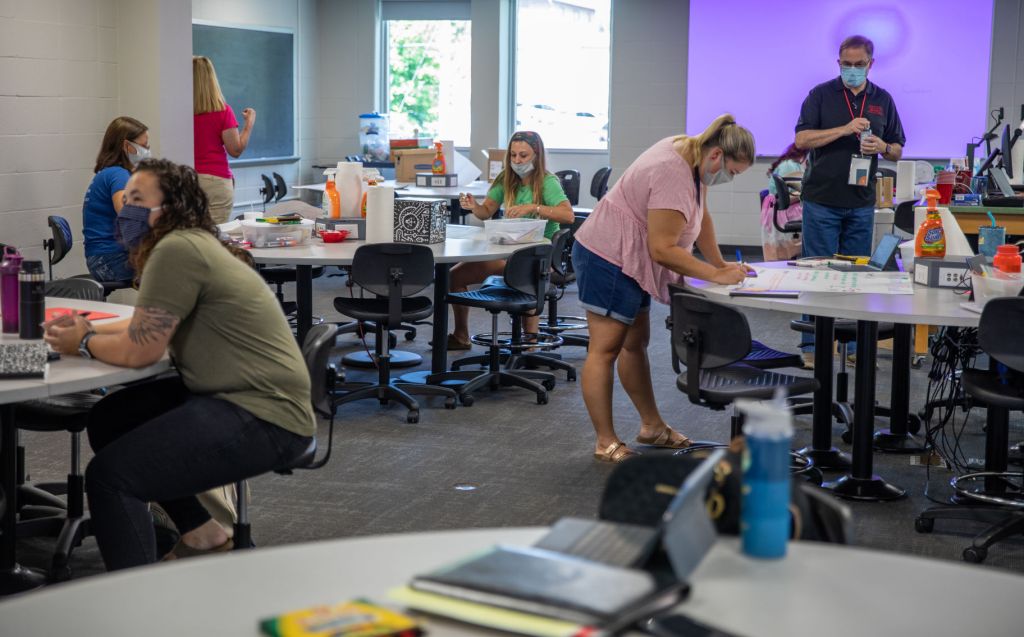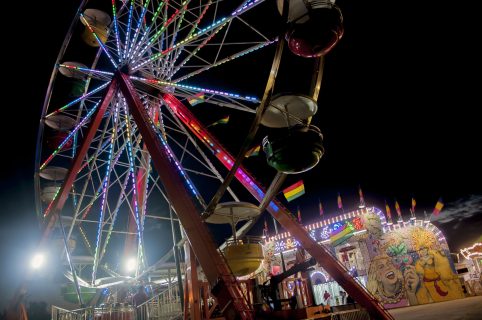WKU hosts teachers hoping to inspire budding scientists
Published 8:00 am Friday, August 7, 2020

- The 2020 cohort of National STEM Scholars work on their challenge projects before posting them on a wall for fellow STEM Scholars to offer suggestions and critiques on Thursday, Aug. 6, 2020, in Western Kentucky University's Kelly Thompson Hall. The 10 scholars selected were chosen based on their long-term project ideas, which they take back to their districts to boost STEM education efforts after the week-long program of training and mentorship at WKU. (Grace Ramey/photo@bgdailynews.com)
Ahead of the start of school this fall, teachers from across the country are gathering at Western Kentucky University for a week of training and mentorship during this year’s National STEM Scholars program.
The program, sponsored by the National Stem Cell Foundation, supports middle grade science teachers as they design hands-on science education projects they can implement in their schools. However, because of the coronavirus pandemic, this year’s group also got the chance to model safe in-person learning practices.
Trending
“Things like this are possible even in the environment we have, but you just have to be thoughtful about it and creative,” said Kerrie McDaniel, an associate biology professor who has been involved with the program for five years.
“We’ve had to rethink a lot of things,” McDaniel said, referring to program coordinators’ efforts to accommodate social distancing, mask use and meal services that won’t spread COVID-19.
On Thursday, nine educators sat at large, circular tables in WKU’s Kelly Thompson Hall, conscious of keeping their distance, and wore face masks. This year’s class of teachers drew participants from across the country, from states such as Virginia and California. They’ll undergo a two-week quarantine when traveling back to their home states, consistent with public health guidelines.
Despite the restrictions, the group of educators was steadfast in their mission to get middle school students interested in science.
“Otherwise, they’re not going to take those AP classes. They’re not going to take additional science electives in high school, and then a lot of times they’re not going to go on and do that in college,” McDaniel said. “If we’re going to have that STEM pipeline, if we’re going to build that next cadre of scientists that are going to solve the world’s problems, we’ve got to catch them in middle school.”
From hydroponics projects to seismology studies, this year’s group approached its work with the goal of offering science instruction to students in an unconventional learning environment.
Trending
Allison Bogart, a teacher from California, is bracing for the start of distance learning in her school district, where she said great pains have been taken to provide every student with a Chromebook and Wi-Fi hotspot.
Still, Bogart couldn’t pass up the opportunity to be a STEM Scholar this year.
“They partner with you to create a real, hands-on project for your own students and then provide the funding for the materials and equipment,” she said.
She was also encouraged by the constant support teachers get during the following school year as they implement their long-term projects and the additional opportunity to attend the National Science Teachers Association Conference later on.
Bogart’s passion is showing students that they can save the world with science. Too often, the subject is viewed as too esoteric and removed from everyday life, “which is absolutely ridiculous because science needs everybody. It needs every voice. It needs every culture, every language,” she said.
Through her project, Bogart wanted to show students how they can use science to solve real-world problems outside the confines of a classroom.
Living in Kernville, Calif. – a small mountain town in the Sierra Nevada about three hours north of Los Angeles – Bogart said she is often discouraged by the litter campers bring with them.
When she noticed campsite dumpsters were overflowing with trash and attracting wildlife foraging for scraps, she imagined a network of micro-computers that could track garbage buildup and direct campers to emptier bins.
She’s hoping her students can make that vision a reality.
“We’re still kind of figuring out the computer processing and the code that the kids would have to create,” Bogart said. “We have a lot of great learning to do, but it’s also solving a real-world problem that we have.”






